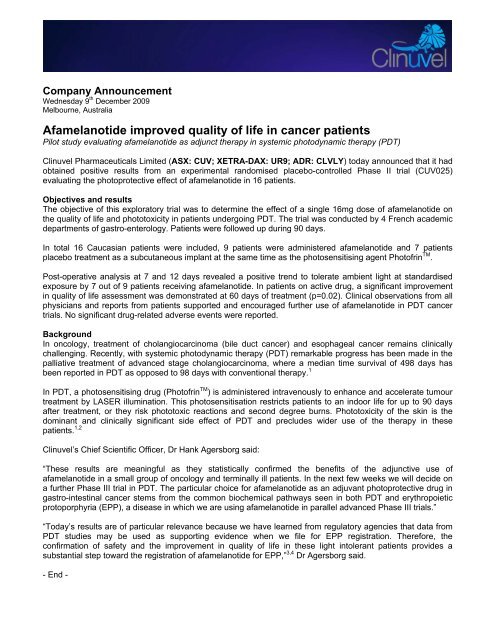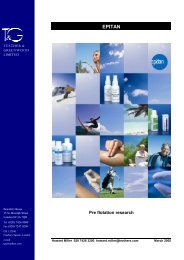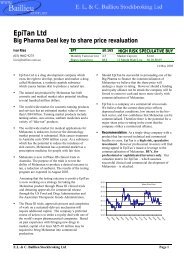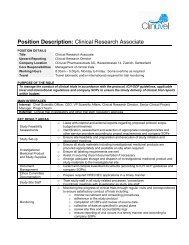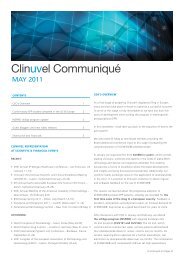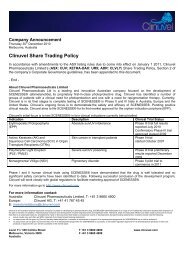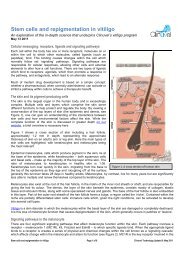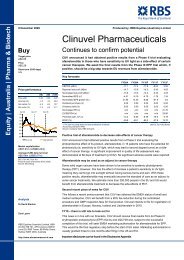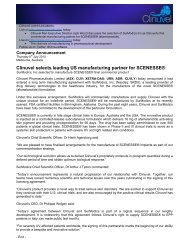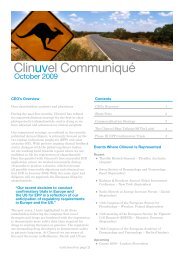Phase II PDT results announcement - Clinuvel Pharmaceuticals
Phase II PDT results announcement - Clinuvel Pharmaceuticals
Phase II PDT results announcement - Clinuvel Pharmaceuticals
You also want an ePaper? Increase the reach of your titles
YUMPU automatically turns print PDFs into web optimized ePapers that Google loves.
Company Announcement<br />
Wednesday 9 th December 2009<br />
Melbourne, Australia<br />
Afamelanotide improved quality of life in cancer patients<br />
Pilot study evaluating afamelanotide as adjunct therapy in systemic photodynamic therapy (<strong>PDT</strong>)<br />
<strong>Clinuvel</strong> <strong>Pharmaceuticals</strong> Limited (ASX: CUV; XETRA-DAX: UR9; ADR: CLVLY) today announced that it had<br />
obtained positive <strong>results</strong> from an experimental randomised placebo-controlled <strong>Phase</strong> <strong>II</strong> trial (CUV025)<br />
evaluating the photoprotective effect of afamelanotide in 16 patients.<br />
Objectives and <strong>results</strong><br />
The objective of this exploratory trial was to determine the effect of a single 16mg dose of afamelanotide on<br />
the quality of life and phototoxicity in patients undergoing <strong>PDT</strong>. The trial was conducted by 4 French academic<br />
departments of gastro-enterology. Patients were followed up during 90 days.<br />
In total 16 Caucasian patients were included, 9 patients were administered afamelanotide and 7 patients<br />
placebo treatment as a subcutaneous implant at the same time as the photosensitising agent Photofrin TM .<br />
Post-operative analysis at 7 and 12 days revealed a positive trend to tolerate ambient light at standardised<br />
exposure by 7 out of 9 patients receiving afamelanotide. In patients on active drug, a significant improvement<br />
in quality of life assessment was demonstrated at 60 days of treatment (p=0.02). Clinical observations from all<br />
physicians and reports from patients supported and encouraged further use of afamelanotide in <strong>PDT</strong> cancer<br />
trials. No significant drug-related adverse events were reported.<br />
Background<br />
In oncology, treatment of cholangiocarcinoma (bile duct cancer) and esophageal cancer remains clinically<br />
challenging. Recently, with systemic photodynamic therapy (<strong>PDT</strong>) remarkable progress has been made in the<br />
palliative treatment of advanced stage cholangiocarcinoma, where a median time survival of 498 days has<br />
been reported in <strong>PDT</strong> as opposed to 98 days with conventional therapy. 1<br />
In <strong>PDT</strong>, a photosensitising drug (Photofrin TM ) is administered intravenously to enhance and accelerate tumour<br />
treatment by LASER illumination. This photosensitisation restricts patients to an indoor life for up to 90 days<br />
after treatment, or they risk phototoxic reactions and second degree burns. Phototoxicity of the skin is the<br />
dominant and clinically significant side effect of <strong>PDT</strong> and precludes wider use of the therapy in these<br />
patients. 1,2<br />
<strong>Clinuvel</strong>’s Chief Scientific Officer, Dr Hank Agersborg said:<br />
“These <strong>results</strong> are meaningful as they statistically confirmed the benefits of the adjunctive use of<br />
afamelanotide in a small group of oncology and terminally ill patients. In the next few weeks we will decide on<br />
a further <strong>Phase</strong> <strong>II</strong>I trial in <strong>PDT</strong>. The particular choice for afamelanotide as an adjuvant photoprotective drug in<br />
gastro-intestinal cancer stems from the common biochemical pathways seen in both <strong>PDT</strong> and erythropoietic<br />
protoporphyria (EPP), a disease in which we are using afamelanotide in parallel advanced <strong>Phase</strong> <strong>II</strong>I trials.”<br />
“Today’s <strong>results</strong> are of particular relevance because we have learned from regulatory agencies that data from<br />
<strong>PDT</strong> studies may be used as supporting evidence when we file for EPP registration. Therefore, the<br />
confirmation of safety and the improvement in quality of life in these light intolerant patients provides a<br />
substantial step toward the registration of afamelanotide for EPP,” 3,4 Dr Agersborg said.<br />
- End -
Appendix I: References<br />
1. Ortner M-A., (2009). “Photodynamic therapy for cholangiocarcinoma: overview and new developments.” Curr Opin<br />
Gastroenterol. 25 (5): 472-476.<br />
2. Jong C.T., et al., (2008). ”The quality of life of 790 patients with photodermatoses.” Brit J Derm. 159 (1): 192-197.<br />
3. Millward L.M., et al., (2001). “Self-rated psychosocial consequences and quality of life in acute porphyrias.“ J Inherit<br />
Metab Dis. 24 (7): 733-747.<br />
4. Lecluse A.L.Y., et al., (2007). “Erythropoietic protoporphyria without skin symptoms-you do not always see what<br />
they feel.” EU J Pediat. 167 (6): 703-706.<br />
Appendix <strong>II</strong> (Following Code of Best Practice, ASX)<br />
Name of trial<br />
CUV025. A <strong>Phase</strong> <strong>II</strong>, multicentre, double blind, placebo-controlled pilot study to evaluate the safety and efficacy of<br />
afamelanotide as adjunctive therapy in patients undergoing Photodynamic Therapy (<strong>PDT</strong>) utilizing porfimer sodium.<br />
Endpoints<br />
a) To determine whether afamelanotide implants can reduce the period of phototoxicity experienced by patients who<br />
have undergone Photodynamic Therapy with porfimer sodium;<br />
b) To evaluate the effect of afamelanotide on quality of life;<br />
c) To evaluate the safety and tolerability of afamelanotide by measuring treatment-emergent adverse events.<br />
Blinding status<br />
Double blind.<br />
Product Development Status<br />
Good Manufacturing Practice (GMP) Standard.<br />
Treatment method, frequency, dose levels<br />
A single implant (16 mg afamelanotide or placebo) administered subcutaneously.<br />
Number of trial subjects<br />
16 patients.<br />
Subject selection criteria<br />
a) Male or female Caucasian subjects undergoing <strong>PDT</strong> with porfimer sodium;<br />
b) Aged greater than 18 years.<br />
Trial location<br />
Multicentre trial in France including Amiens, Angers, Brest and Paris Hospitals.<br />
Duration of the trial<br />
Approximately 6-12 months.<br />
Trial standard<br />
In compliance with Good Clinical Practices (GCP) and ICH guidelines.<br />
Appendix <strong>II</strong>I: About afamelanotide<br />
Afamelanotide is a first-in-line therapeutic being developed by <strong>Clinuvel</strong>. An analogue of α-MSH, afamelanotide is a linear<br />
peptide which activates the skin to activate and produce eumelanin, the dark pigment which is known to have<br />
photoprotective properties (providing skin protection against light and UV radiation). Increased pigmentation of the skin<br />
appears a few days after administration of afamelanotide and lasts up to 60 days. Afamelanotide is administered<br />
underneath the skin as a dissolvable implant approximately the size of a grain of rice.<br />
About <strong>Clinuvel</strong> <strong>Pharmaceuticals</strong> Limited<br />
<strong>Clinuvel</strong> <strong>Pharmaceuticals</strong> Ltd is a leading and innovative Australian company focused on the development of<br />
afamelanotide, its proprietary first-in-class photoprotective drug. <strong>Clinuvel</strong> has identified five groups of patients with a<br />
clinical need for photoprotection. Currently, <strong>Clinuvel</strong> is in its final stages to complete testing of afamelanotide in <strong>Phase</strong> <strong>II</strong><br />
and <strong>II</strong>I trials in Australia and Europe. <strong>Clinuvel</strong>’s ongoing focus is to demonstrate the safety and efficacy of afamelanotide.<br />
Pending positive clinical <strong>results</strong>, <strong>Clinuvel</strong> aims to file afamelanotide for its first market approval for the orphan indications<br />
porphyria (EPP) and solar urticaria (SU).<br />
<strong>Clinuvel</strong> is currently testing afamelanotide in five clinical indications:<br />
Indication Description Clinical Trial Status
Erythropoietic Protoporphyria<br />
(EPP)<br />
Solar Urticaria<br />
(SU)<br />
Photodynamic Therapy (<strong>PDT</strong>) -<br />
systemic<br />
Absolute sun/UV intolerance<br />
Acute anaphylactic reaction to sun/UV<br />
Phototoxicity following cancer treatment<br />
<strong>Phase</strong> <strong>II</strong>I trial preliminary<br />
<strong>results</strong> due<br />
Confirmatory <strong>Phase</strong> <strong>II</strong>I trial<br />
approved August 2009<br />
<strong>Phase</strong> <strong>II</strong> trial <strong>results</strong><br />
reported July 2009<br />
<strong>Phase</strong> <strong>II</strong> trial <strong>results</strong> reported<br />
December 2009<br />
Polymorphic Light Eruption<br />
(PLE / PMLE)<br />
Actinic Keratosis (AK) and<br />
Squamous Cell Carcinoma (SCC) in<br />
Organ Transplant Recipients (OTRs)<br />
Severe sun/UV poisoning<br />
Skin cancer in transplant patients<br />
<strong>Phase</strong> <strong>II</strong>I trial preliminary<br />
<strong>results</strong> due<br />
<strong>Phase</strong> <strong>II</strong> trial<br />
started October 2007<br />
<strong>Phase</strong> I and <strong>II</strong> human clinical trials using afamelanotide have demonstrated that the drug is well tolerated and no<br />
significant safety concerns have been identified to date.<br />
About Photodynamic Therapy (<strong>PDT</strong>)<br />
In <strong>PDT</strong>, a photosensitising drug (Photofrin TM ) is administered intravenously to enhance and accelerate tumour treatment<br />
by LASER illumination. The photosensitiser in the tumour absorbs the light and produces an active form of oxygen that<br />
destroys nearby cancer cells.<br />
Photosensitising agents such as porfimer sodium (Photofrin TM ) make skin and eyes ultra sensitive to light for up to 90<br />
days following treatment. Patients suffer intense pain and second degree burns associated with this phototoxicity and are<br />
forced to avoid sunlight/artificial light for up to 90 days following treatment.<br />
The main advantages of <strong>PDT</strong> over other cancer therapies include the significant degree of selectivity of drug<br />
accumulation in the tumour tissue, and the ability to retreat a recurrent tumour. <strong>PDT</strong> has proven valuable as a treatment<br />
option in cancers such as esophageal cancer, gastric, endobronchial, papillary bladder and gliomas. Phototoxicity of the<br />
skin is the dominant and clinically significant side effect of <strong>PDT</strong> and precludes wider use of the therapy in these patients.<br />
For more information contact:<br />
Lachlan Hay<br />
Head of Global Network and Communications<br />
<strong>Clinuvel</strong> <strong>Pharmaceuticals</strong> Limited<br />
T: +61 3 9660 4900<br />
E: investorrelations@clinuvel.com<br />
<strong>Clinuvel</strong> is an Australian biopharmaceutical company focussed on developing its photoprotective drug, afamelanotide for a range of UV-related skin disorders resulting from exposure of the skin to harmful<br />
UV radiation. Pharmaceutical research and development involves long lead times and significant risks. Therefore, while all reasonable efforts have been made by <strong>Clinuvel</strong> to ensure that there is a<br />
reasonable basis for all statements made in this document that relate to prospective events or developments (forward-looking statements), investors should note the following:<br />
• actual <strong>results</strong> may and often will differ materially from these forward-looking statements;<br />
• no assurances can be given by <strong>Clinuvel</strong> that any stated objectives, outcomes or timeframes in respect of its development programme for afamelanotide can or will be achieved;<br />
• no assurances can be given by <strong>Clinuvel</strong> that, even if its development programme for afamelanotide is successful, it will obtain regulatory approval for its pharmaceutical products or that such<br />
products, if approved for use, will be successful in the market place<br />
Level 11 / 330 Collins Street T +61 3 9660 4900 www.clinuvel.com<br />
Melbourne, Victoria 3000 F +61 3 9660 4999<br />
Australia


